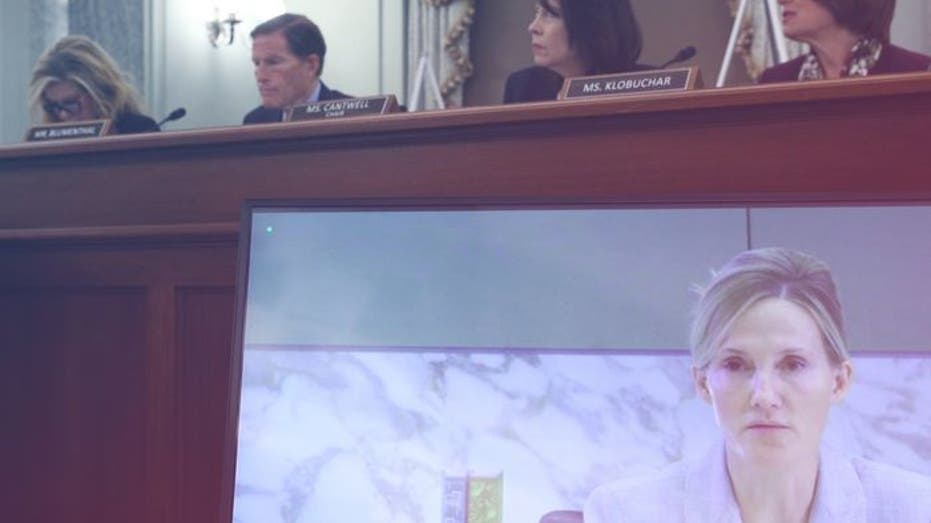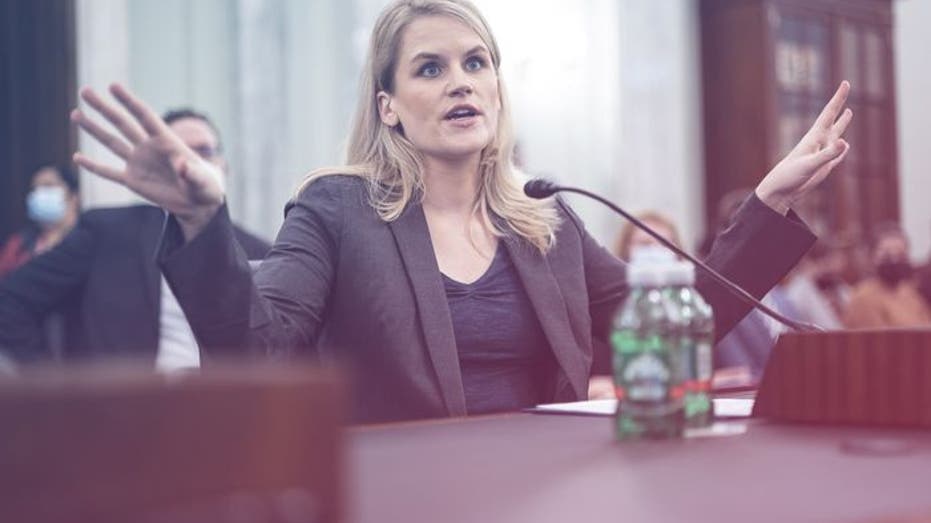[ad_1]
Kaltbaum Capital Management President Gary Kaltbaum on Facebook’s name change.
The day after former Facebook employee and whistleblower Frances Haugen went public in October, the company’s team in Washington started working the phones.
To lawmakers and advocacy groups on the right, according to people familiar with the conversations, their message was that Ms. Haugen was trying to help Democrats. Within hours, several conservative news outlets published stories alleging Ms. Haugen was a Democratic activist.
Later, Facebook lobbyists warned Democratic staffers that Republicans were focused on the company’s decision to ban expressions of support for Kyle Rittenhouse, the teenager who killed two people during unrest in Kenosha, Wis., and who was later acquitted of homicide and other charges.
The company’s goal, according to Republicans and Democrats familiar with the company’s outreach, was to muddy the waters, divide lawmakers along partisan lines and forestall a cross-party alliance that was emerging to enact tougher rules on social-media companies in general and Facebook in particular.
Ms. Haugen’s revelations, and the thousands of internal documents she took with her when she quit Facebook earlier this year, showed the company’s influence on political discourse, teen mental health and other matters. The resulting backlash was emerging as the company’s biggest crisis in years.
Pushing politics to the forefront was one part of Facebook’s response, in keeping with a sharp-elbowed approach driven by Chief Executive Mark Zuckerberg, according to people familiar with the matter.

Senators listen to testimony from former Facebook employee Frances Haugen at a hearing on Oct. 5. (Photo: Drew Angerer/Press Pool)
The company conducted reputational reviews of new products. To deter further leaks, internal access settings for research discussions on topics, including mental health and radicalization, were restricted to those directly involved in the work, according to employees and others familiar with the restrictions. Company researchers said they have been asked to submit work on sensitive topics for review by company lawyers, who have sometimes asked for examples of problems to be excised from internal posts.
Mr. Zuckerberg later changed the company’s name to Meta Platforms Inc., to emphasize what he called a new focus on building the metaverse, an immersive digital world he has described as the next phase of the internet. He has been conducting meetings in virtual reality, with digital avatars standing in for the executives, according to people familiar with the meetings. He has encouraged other employees to do the same.
The implication is that Facebook should look toward the future and not get bogged down in the messy past.
RUSSIAN COURT SLAPS GOOGLE, META WITH MASSIVE FINES
WSJ subscribers are invited to download an exclusive collection of coverage from WSJ reporters on The Facebook Files.
Former executives said Mr. Zuckerberg has told employees not to apologize. In contrast to previous controversies, in which the CEO publicly claimed ownership of the company’s mistakes and typically addressed them head-on, Mr. Zuckerberg has spoken little publicly about Ms. Haugen’s disclosures and sent deputies to testify before Congress.
“When our work is being mischaracterized, we’re not going to apologize,” said Facebook spokesman Andy Stone. “We’re going to defend our record.”
Facebook has acknowledged changes to its research operations but pledged to continue the work to understand the impact of its platforms. The company has also said that it invests billions of dollars to protect the safety of its users.
Starting in September, The Wall Street Journal published a series of articles, called The Facebook Files, which identified harm caused by the social-media giant’s platforms, as identified by its own researchers, and its challenges in addressing them. Based in part on Ms. Haugen’s documents, the articles detailed such matters as how Facebook’s algorithm fosters discord and how its researchers concluded that its platforms, especially Instagram, could negatively affect teen mental health.
Ms. Haugen subsequently made the documents available to other media outlets, which published their own articles.
Since then, there have been four U.S. congressional hearings related to issues raised in the articles; a bipartisan coalition of state attorneys general launched an investigation into Instagram’s effects on children; and more than a half-dozen prominent Meta executives and other senior employees have departed or announced their departures.
“The documents speak for themselves,” said Sen. Mike Lee of Utah, the leading Republican on the Senate antitrust subcommittee and a member of the consumer protection subcommittee. He said he is pursuing legislation that would promote more market competition in social media and add more protections for children online.

Antigone Davis, Meta’s global head of safety, testified virtually at a Senate hearing on Sept. 30. She spoke about the company’s work with its safety advisory board. (Photo: Tom Brenner/Press Pool)
Facebook has responded to criticism by citing billions of dollars of investments it has made in online safety, as well as partnerships with outside entities and experts. During a Sept. 30 hearing, Antigone Davis, Meta’s global head of safety, pointed to the company’s work with its safety advisory board, created more than a decade ago, which includes internet-safety experts from around the world.
Facebook has previously said it conducted its own research to identify issues and devise ways to address them.
Advisory board
Several members of that advisory board, whose organizations are paid $25,000 a year by Meta, were caught off guard by the Journal’s reporting, according to people close to it. The company hadn’t shared its research into Instagram’s effects on teen girls, nor had it disclosed the relatively small amount of resources committed to protect users in developing countries, those people said.
Some advisory-board members proposed quitting, according to people familiar with the discussions. Some board members ultimately drafted a letter shared with Ms. Davis and other Facebook employees on Oct. 11, calling the disclosures “a pivotal moment for Facebook.”
The draft letter recommended that Facebook overhaul its business model; appoint an executive focused on safety to report to the CEO; make more internal data available to independent researchers; and clearly explain what kind of regulation they could stomach.
Members of the board spoke with Facebook employees about revising the letter before sending it to Meta Chief Operating Officer Sheryl Sandberg and other Facebook leaders. In the end, no letter was sent, and no one resigned from the advisory board.
Facebook’s independent oversight board, which provides guidance about the company’s policy-enforcement systems, also expressed its frustrations with the company, stating on its website that Meta had been “not fully forthcoming” in disclosing information about its troubled enforcement program for VIP users, known as XCheck. In response, the company committed to providing the board with what the board called “wider context” going forward.

Mr. Zuckerberg spoke to an avatar of himself in the metaverse during a live-streamed virtual and augmented reality conference to announce the rebranding of Facebook as Meta. Photo: FACEBOOK via reuters (Reuters)
Mr. Zuckerberg pushed subordinates to respond more forcefully to the bad publicity, according to people familiar with the discussions.
Nick Clegg, the company’s vice president of global affairs and a former deputy prime minister of the U.K., was among those advising Mr. Zuckerberg to take a more restrained approach, according to two people familiar with the discussions. The company ultimately issued a written statement under Mr. Clegg’s name in which it said the Journal’s articles included “deliberate mischaracterizations” and cherry-picked documents, but said it was legitimate for Facebook to be scrutinized over how it dealt with serious and complex issues.
Among the board of directors, longtime members Peter Thiel and Marc Andreessen were the voices encouraging Mr. Zuckerberg to push back against the criticism, according to people familiar with the discussions.
In a virtual meeting in late November, some of Meta’s largest institutional investors asked Facebook to address some of the issues around user safety, according to people familiar with the call. Some investors found Mr. Zuckerberg, who also is chairman, defensive on the call, these people said. They left dissatisfied with Facebook’s overall response, because the company reiterated previous talking points and didn’t share any big new changes, according to a written briefing about the meeting described to the Journal.
Meta shares are down about 9% since the publication of the first of the Journal’s Facebook Files articles.

Frances Haugen, who turned over internal Facebook documents to regulators, testified before the Senate on Oct. 5. Photo: Jabin Botsford/The Washington Post/Bloomberg
In early December, Facebook’s board convened for its annual retreat at Mr. Zuckerberg’s 1,300-acre beachfront estate in Kauai, Hawaii. Board members discussed matters including Ms. Haugen and the release of internal documents, regulatory issues and how to chart a path forward for the company on the metaverse, people familiar with the meetings said. While they were losing some top executives and the recent past had been challenging, officials were broadly supportive of Mr. Zuckerberg’s push toward the next phase of the virtual world, people familiar with the discussions said.
Separately, some Meta officials have discussed hiring a high-ranking outsider who could take some of the pressure off Mr. Zuckerberg and Ms. Sandberg and add a fresh perspective to the senior ranks, one person familiar with the discussion said. The Facebook spokesman said no such conversation took place at the board meeting or other official event.
Mr. Zuckerberg isn’t in favor of major changes to Meta’s product strategy. Before the head of Instagram testified at a congressional hearing in December about the platform’s impact on teens, Meta executives discussed the possibility of ending development on its version of Instagram for children, one of the people familiar with those discussions said. Mr. Zuckerberg said that wasn’t an option, the person said. The company has said the project is paused indefinitely.

Adam Mosseri, head of Meta’s Instagram unit, testified on Dec. 8 at a Senate hearing looking into the platform’s effect on children. Photo: Rod Lamkey/CNP/Zuma Press
The company considered suing Ms. Haugen but decided the public perception would be that it was trying to silence a whistleblower, said people familiar with the matter.
Political spin
Instead, after Ms. Haugen was…
[ad_2]
Read More: Facebook’s pushback: Stem the leaks, spin the politics, don’t say sorry
